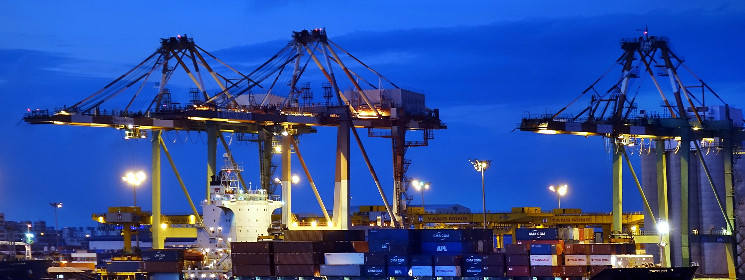A growing number of global companies turn to blockchain technology and other emerging technologies to improve the efficiency of their activities, with operators in the transport and maritime sectors that are in charge.
Railway companies in Japan, France and Indonesia double new ticketing technology, focused on face recognition and blockchain. A diverse group of operators establishes their presence in the emerging technology system by including QR codes, artificial intelligence (AI) and Near-Field Communication (NFC) technology in the transport sector.
SNCF, the national rail operator of France, has rolled out a series of tests with blockchain-based digital IDs for ticketing. Passengers leaning on the mobile app of France, the ticketing officer must show a QR code with identification data and seats.
Experiments with the mobile app have been going on since 2024 and the SNCF has hinted that it can extend the tests to new routes and trains.
In the Far East, the Japanese Keisei Electric Railway Company (K’Sei) has announced a new selection of photo recognition to illuminate the ticket procedure at stations. Dubbed the face check -in Go, the new system wants to reduce long crowds by half and encourage other rail operators in the country to follow.
The neighboring Indonesia’s state visit service also uses the power of emerging technology. The Kereta API Indonesia (KAI) revealed that more than 10 million passengers have its face verification offer since the rollout in 2022. Kai President Didiek Hartyo noted in an interview that the system had eliminated the need for paper tickets in Java and Sumatra, are seamless User interface.
Because operators gallop forward with the next generation of technologies, experts argue for decentralization to protect the personal data of passengers. Data collection has been exhausted with rising schedules for discovering tickets, forcing rail operators to collect and store parts of passengers’ data.
Various high -profile data leaks involving rail operators in the United States, India and the Netherlands, have forced players in the industry to explore new ways to protect personal information.
Key State Capital, venture capital company, argues for a blockchain solution to protect rail operators against destructive data leaks. The company quotes zero -knowledge proofs (ZKP) systems with which passengers can only share necessary data with operators and blockchain’s immutability as reasons for an industrial switch.
A study from the University of Birmingham argues strongly for railway providers to hire ticket systems in chains, pointing to cost efficiency and transparency for parties. In a practical use case, India leans on blockchain for his sabotage-proof signaling options after a tragic accident that claimed more than 300 lives.
Shipping sector drives the blockchain -boom
Although blockchain technology has planted its feet in the supply chain industry, a new partnership is investigating its use for paperwork with dangerous cargo in ships.
The regulation with Cosco Sharpentines (Cosco) and the Global Shipping Business Network (GSBN) is intended to use blockchain as the underlying architecture of dangerous freight documentation.
The duo has since rolled out a pilot program since then at the end of 2024, in which he, based on Chinese Longxing Chemical Stock Co., Ltd. pulled to participate in the studies. The experiments include making documentation on chains in accordance with the best practices of industry and safety procedures.
The pilot saw Cosco Ferry Longxing Chemical’s Carbon Black, a combustible material used in rubber production, in the landing gate. In a strong show of innovation, Cosco turned to GSBN’s blockchain-based infrastructure for documentation, which marks a transition from traditional bottlenecks associated with annoying paperwork.
The transport of dangerous materials requires strict compliance with safety certifications, but checking the boxes is often loaded with delays and steep costs.
Pundits say that if battle owners offer safety certifications, shipping companies can verify their authenticity in record time using blockchain-based systems. In the pilot program, the participants turned to GSBN’s China National Accreditation Service for Conformity Assessment (CNAS) to verify Longxing’s certifications.
Participants say that the pilot has simplified the documentation process and at the same time an audit efficiency streamline with the help of solutions for chains. Experts believe that the use of this model in the industry will help prevent unexpected incidents on ships and to stop using fake documents.
The pilot is the first time that Cosco and GSBN explore a blockchain-based certification model, where both parties tinker with the idea for most of a year.
The current state of the global shipping industry reveals a migration to blockchain technology in an attempt to keep the burning pace of digitization. In Hong Kong dumps shipping operators traditional paperwork for blockchain-based electronic accounts of cargo (EBL) powered by GSBN.
Since their rollout in 2023, the GSBN initiative has registered more than 200,000 EBLs on the chain, leaning on a third party for appreciation and tokenization.
India has also expressed plans to use blockchain to bring about a revolution in its maritime industry with the Philippines and Japan that double their existing digitization efforts.
View: with blockchain, the usefulness is becoming increasingly important
https://www.youtube.com/watch?v=AZDJDLX7FVS title = “YouTube Video Player” Frameborder = “0” All = “Accelerometer; Autoplay; clipboard-Write; coded-media; gyroscope; Picture-in-Picture; Web-Share” ReferencerPolicy = “Strict-Origin-When-Crossss Origin “Tolfullscreen>











